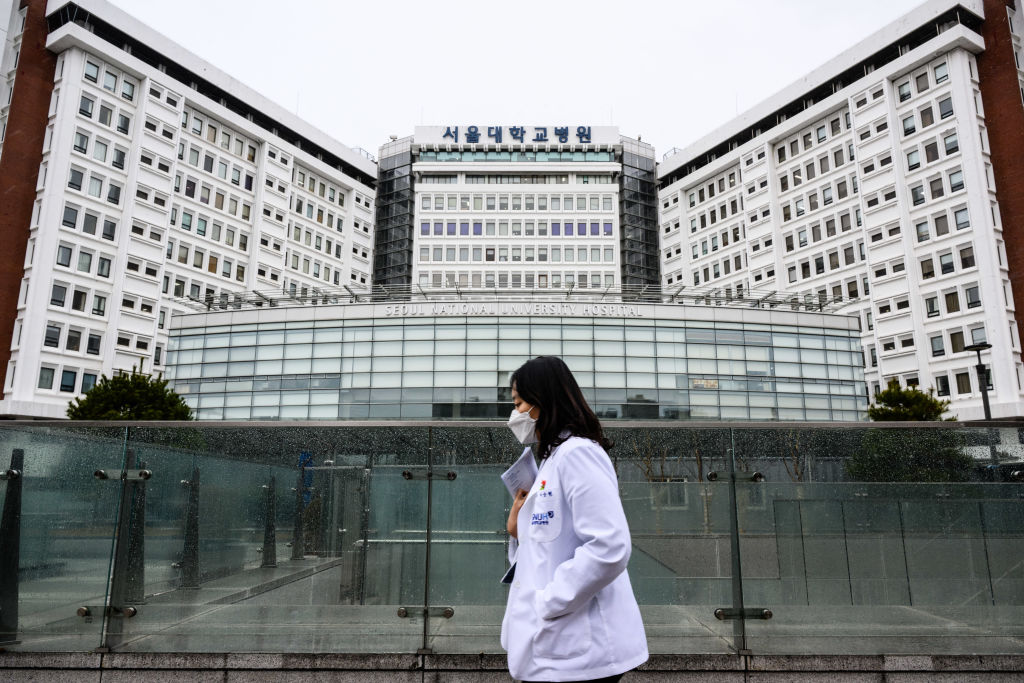
South Korean authorities, increasingly desperate as over 90% of the country’s junior doctors have gone on strike, are looking to the military for help, announcing that they would start deploying military medical personnel to public hospitals to address the crippling shortage of doctors.
Twenty military surgeons and 138 public health doctors will be sent to 20 hospitals for four weeks, Health Minister Cho Kyoo-hong said on Sunday.
South Korea’s defense ministry said at a news briefing on Monday that it would dispatch more military doctors to general hospitals if needed and that the deployment would not significantly affect defense operations, which has roughly 2,400 total military doctors. Military hospitals have already accepted over 100 public patients for treatment since the strike, as part of emergency measures to cope with the absence of doctors in the country’s largest hospitals.
The South Korean government is still pressuring striking doctors to return to work, having threatened them with legal punishment and the suspension of their medical licenses after many defied an ultimatum to end the walkout at the beginning of March. Since last week, authorities have sent out notices to some 5,000 trainee doctors warning them about the imminent suspension of their medical licenses, and criminal complaints were filed against five of the strike’s alleged leaders the week prior.
Health Minister Cho said on Monday that the government will be lenient towards trainee doctors who return to work before their licenses are officially suspended. Authorities also announced on Friday plans to set up a reporting center to ensure the safety of returning doctors, amid allegations that some returnees were being bullied by strikers.
The doctors strike has persisted in a stalemate for weeks, with 12,000 of 13,000 resident doctors having walked off the job as of March 8, according to the Ministry of Health. They are protesting a government plan to tackle a longstanding shortage of doctors in the country by increasing the annual quota for medical students from 3,058 to 5,058. The protesting doctors argue such a move will do little to address poor working conditions that lie at the root of the personnel shortages in certain medical departments, while critics claim the doctors are only concerned that the increased number of students in the field will hurt their competitive pay and social prestige.
Current medical students are also boycotting school in solidarity with the striking doctors. As of Sunday, there were around 5,500 applications for leaves of absence—accounting for nearly 30% of the country’s medical students—though no permission has been granted for these applications, the health ministry said. Thirty medical schools have postponed the start of the semester amid the chaos. Meanwhile, some senior doctors are also leaving their jobs in support of their younger colleagues.
The South Korean government has so far denied that the strike has sent the country’s healthcare system spiraling into a crisis, but local media reports paint a somber picture of how hard hospitals have been hit: surgeries and treatments—including for serious illnesses such as cancer—have been canceled, and many patients have been made to endure long waiting times or been turned away by hospitals due to the lack of manpower. Required to fill the growing gap, nurses are now authorized to perform tasks usually reserved for doctors, such as administering emergency medication and performing CPR.
While the government has refused to budge on its quota expansion plan, with Cho even saying on Sunday that the government would speed up its implementation of the quota expansion plan, officials have maintained that they are open to discussing the issue with the medical community, though previous efforts at negotiations between authorities and the striking doctors have fallen through. In an attempt to address the main complaints from doctors, the government announced last week a pilot program of shorter work hours for young doctors and promised additional payments for trainee doctors in departments such as pediatrics and emergency medicine.
“I hope that residents who have left their patients will also take seriously their social responsibility and dignified professional spirit as medical professionals,” Lee Han-kyung, a senior official from the interior ministry, said Monday.
More Must-Reads from TIME
- Donald Trump Is TIME's 2024 Person of the Year
- Why We Chose Trump as Person of the Year
- Is Intermittent Fasting Good or Bad for You?
- The 100 Must-Read Books of 2024
- The 20 Best Christmas TV Episodes
- Column: If Optimism Feels Ridiculous Now, Try Hope
- The Future of Climate Action Is Trade Policy
- Merle Bombardieri Is Helping People Make the Baby Decision
Contact us at letters@time.com